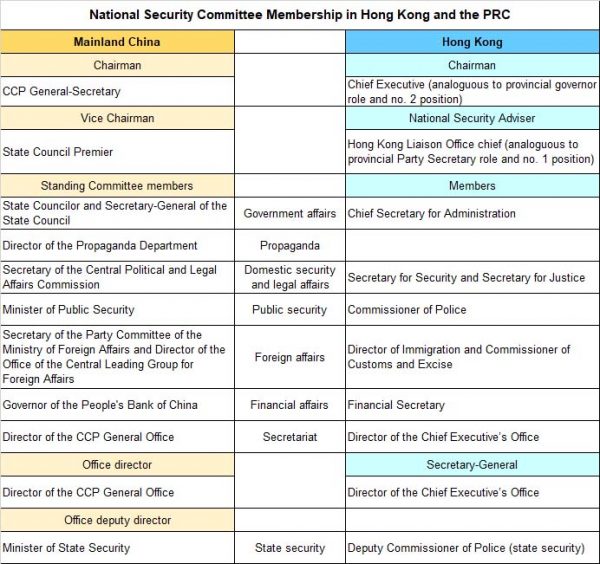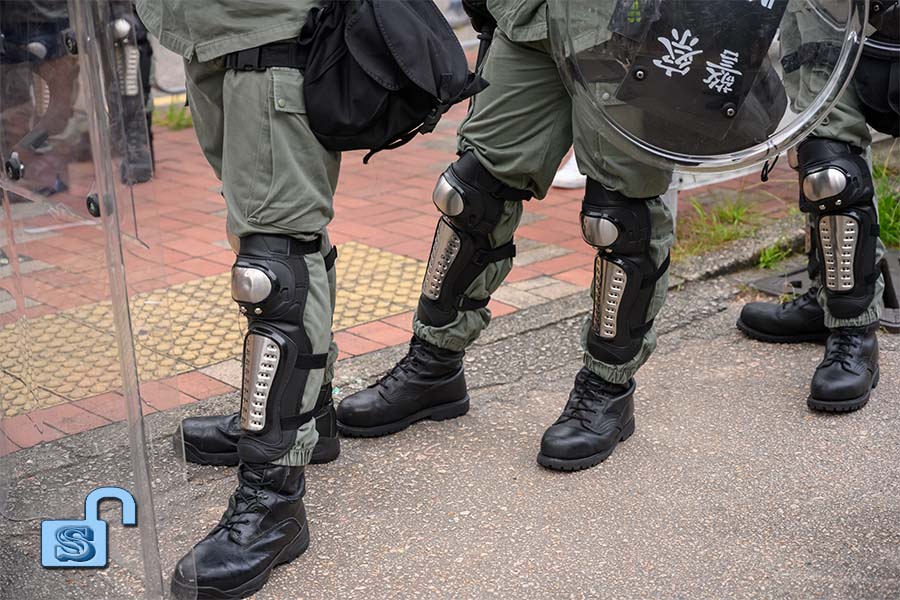◎ Xi and the CCP can use the Hong Kong national security law for both offensive and defensive purposes.
On July 6, the Committee for Safeguarding National Security of the Hong Kong Special Administrative Region convened its first meeting. Hong Kong Chief Executive Carrie Lam served as the Committee’s chairperson, while Luo Huining, director of the People’s Republic of China’s Liaison Office in Hong Kong, was named national security advisor to the Committee. Other members include Chief Secretary for Administration Matthew Cheung, Financial Secretary Paul Chan, Secretary for Justice Teresa Cheng, Secretary for Security John Lee, Commissioner of Police Tang Ping-keung, Deputy Commissioner of Police Edwina Lau, Director of Immigration Au Ka-wang, Commissioner of Customs and Excise Hermes Tang, and Director of the Chief Executive’s Office Chan Kwok-ki.
The Committee’s membership sheds light on how the Chinese Communist Party’s secretive National Security Commission (NSC) apparatus is organized at the provincial government level and its jurisdiction. We believe that the CCP’s national security apparatus under Xi Jinping is a supra-authority organization (超級權力機構) aimed foremost at preserving Party survival against domestic and external “threats.” The new Hong Kong national security law also allows the CCP to impose its draconian national security regime on the world through Hong Kong and further its domination agenda.
Supra-authority organization
Many observers mistakenly believe that CCP leaders can simply snap their fingers and get whatever they want accomplished because theoretically, the “Party leads everything” in the CCP’s Party-state governance system. Reality, however, is more challenging. For instance, a CCP leader has to rely on his State Council premier to coordinate the various state ministries and departments to push through economic policies, and those ministries and departments are ultimately accountable to the premier, not the CCP leader, due to the organization of the Party-state system. In other words, it is possible for a CCP leader to want certain policies but have no control over their implementation due to bureaucratism and factional politics.
Historically, CCP leaders have rammed through their pet projects and minimized the problems of bureaucratism and factional politics by establishing supra-authority organizations. Supra-authority organizations have overwhelming authority over the Party-state apparatus, tend to be extralegal, and have extraordinary latitude to coordinate Party-state affairs to accomplish what the CCP leader wants. Examples of supra-authority organizations include Mao Zedong’s Cultural Revolution Group, which directed the Cultural Revolution and allowed Mao to circumvent the Politburo, and Jiang Zemin’s “610 Office,” which planned, commanded, and assessed the Party-state’s persecution of Falun Gong. We believe that the CCP’s national security apparatus under Xi Jinping can be considered a supra-authority organization, at least on paper, given the composition of national security committees at the central and provincial level, the scope and provisions of national security legislations, and the CCP’s understanding of what constitutes national security.
National security is traditionally understood to refer to the security and defense of a nation-state. For the CCP, however, “national security” means the security and survival of the Party, its regime, and its ideology. Thus, any individual, group, or country that the Party perceives to be a threat to its survival are fair game for retaliatory measures in the name of “national security.” Meanwhile, language in the Hong Kong national security law such as “secession,” “subversion,” “terrorism” and “collusion with foreign forces” are vaguely defined to facilitate the CCP’s targeting of regime troublemakers under the flimsiest of charges. “Show me the man and I’ll find you the crime,” Beria, Stalin’s security and secret police chief, infamously quipped. With the passage of the Hong Kong national security law (see Article 38 of the legislation), citizens of mainland China, Hong Kong, and even the rest of the world whom the CCP considers to be enemies/“national security threats” are now at risk of being subjected to arbitrary communist regime “justice” as defined by Beria.
The scope and provisions of Hong Kong and PRC national security legislations also indicate that the national security apparatus under Xi is a supra-authority organization. For instance, the 2015 PRC national security law covers 11 areas that comprise virtually all major aspects of Chinese society, including political security, economic security, military security, cultural security, and technological security. Meanwhile, the Hong Kong national security law is so overly broad as to be all-encompassing, and Article 38 of the law exerts extraterritorial jurisdiction over all persons in the world. The Hong Kong law even has provisions that allow the Hong Kong government’s National Security Committee and the CCP’s Hong Kong national security office to operate beyond judicial scrutiny (Articles 14, 57, 60, 61); subjects persons being held on national security grounds to an extralegal process (Article 41: close-door trials; Article 46: trial without jury); does not subject the Hong Kong government to financial expenditure restrictions when “safeguarding national security” and establishing the various national security institutions (Article 19); and can potentially see persons detained indefinitely if they are held on national security grounds (Articles 41 and 42).
Finally, the composition of national security committees in Hong Kong and at Party Central level hint at the membership of national security committees at the provincial level. News reports of a February 2017 CCP Central National Security Commission (CNSC) meeting identify Xi as CNSC chairman and Li Keqiang as vice chair. The meeting was attended by 12 members of the Politburo and its Standing Committee (including Xi), members of the Central Military Commission, as well as the heads of the diplomatic apparatus and the central bank—in other words, the persons-in-charge of Party or state organs that oversee the 11 areas of “national security” covered in the 2015 PRC National Security Law. While the full membership of the CNSC of the 19th Party Congress has not yet been unveiled, its membership likely corresponds with those in the Hong Kong National Security Committee plus positions unique to the PRC, i.e. top officials in charge of key portfolios like economics and finance, public security, foreign affairs, the military, propaganda, etc. (see the table below). The membership of national security committees at the provincial level in mainland China should also correspond to their Hong Kong and Party Central counterparts. With the heads of the key Party and state organs directly answerable to Xi Jinping on “national security” issues via the CNSC and provincial-level (including Hong Kong) committees reporting directly to the CNSC, it is clear that Xi has succeed in turning the national security apparatus that was created during his first term in office into a supra-authority organization.

What’s next
1. The CCP factional struggle and political survival-domination drove Xi Jinping to establish the CNSC and consolidate control over the Jiang Zemin faction-controlled domestic security apparatus and intelligence apparatus during his first years in office. Now, the escalation of the factional struggle and the Sino-U.S. “new cold war” appear to have convinced Xi to “upgrade” the national security apparatus into a supra-authority organization and approve of national security legislation that imposes extraterritorial jurisdiction over the world so that he can better deal with the two major crises threatening his leadership.
Xi and the CCP can use the Hong Kong national security law for both offensive and defensive purposes. The law improves the CCP’s survivability in a “new cold war” by making it extremely difficult for the United States and Western powers to “capture” Hong Kong (ideologically, financially, politically, etc.) and “transform” the territory into an “anti-CCP base” to make inroads into the mainland. On the offensive front, the CCP can potentially use the Hong Kong national security law to extradite people in the 20 countries that have formal extradition treaties with Hong Kong on “national security” grounds. The Hong Kong law also allows the CCP to use a more persuasive “carrot and stick” approach to win over American social media giants like Facebook and Twitter: If Western social media companies are willing to surrender user data to the Hong Kong government under the national security law, the CCP could promise them access to the lucrative mainland market; if they do not surrender data, the CCP will use the national security against those companies and even bar them from the Hong Kong/China market.
2. A supra-authority national security apparatus, however, is a double-edged sword for Xi Jinping in the CCP factional struggle. On the one hand, Xi will unlikely be forced into ordering a Tiananmen-like suppression in Hong Kong that his factional rivals can leverage against him because the national security law has thus far proven highly effective in silencing the Hong Kong people and making it difficult for them to protest. On the flipside, Xi’s rivals can take advantage of the national security legislation and Party orthodoxy to undermine his leadership on the Falun Gong issue in Hong Kong and other sensitive human rights matters. Already, Falun Gong practitioners have been attacked and menaced by the triad elements and the Hong Kong police within a week after the national security law was passed; a Hong Kong police officer even threatened to send a Falun Gong adherent to mainland China to have her “organs harvested alive.”
Previous CCP supra-authority organizations did not survive factional struggles. The Cultural Revolution Group was dissolved in 1969 and its key members were purged. Meanwhile, the “610 Office” was criticized by the Central Commission for Discipline Inspection for showing “a disparity in comprehensively studying and implementing the spirit of the rule of law” and a lack of “political sensitivity” in 2016 and was formally disbanded at the 2018 Two Sessions with the rollout of sweeping Party-state institutional reforms (the persecution of Falun Gong, however, remains on the books). Xi’s national security apparatus may be all-powerful now, but will almost certainly be reconstituted in the event that he is ousted.
3. The Trump administration looks set to punish the CCP for passing the Hong Kong national security law. The administration has already begun ending preferential treatment for Hong Kong and the U.S. State Department has imposed visa restrictions on current and former PRC officials. According to a news report, lower level officials are supporting a proposal to target Hong Kong dollar’s peg to the U.S. dollar, as well as scrapping a U.S.-Hong Kong extradition treaty and cooperation with the Hong Kong police. We believe that the U.S. and other countries must get tough on the PRC in words and actions to force the CCP to think twice before abusing the Hong Kong national security law.
Strong U.S. and international actions against the PRC over Hong Kong will convince Xi Jinping that he is right to impose national security legislation over the territory to deal with a “new cold war.” While the Party will likely rally around Xi for now, things could change very quickly should U.S. and international retaliation prove to be too punishing and Xi is unable to handle the fallout. We believe that escalations in the CCP factional struggle will likely lead to political Black Swans in China and the arrival of a “Berlin Wall” moment for the CCP.













